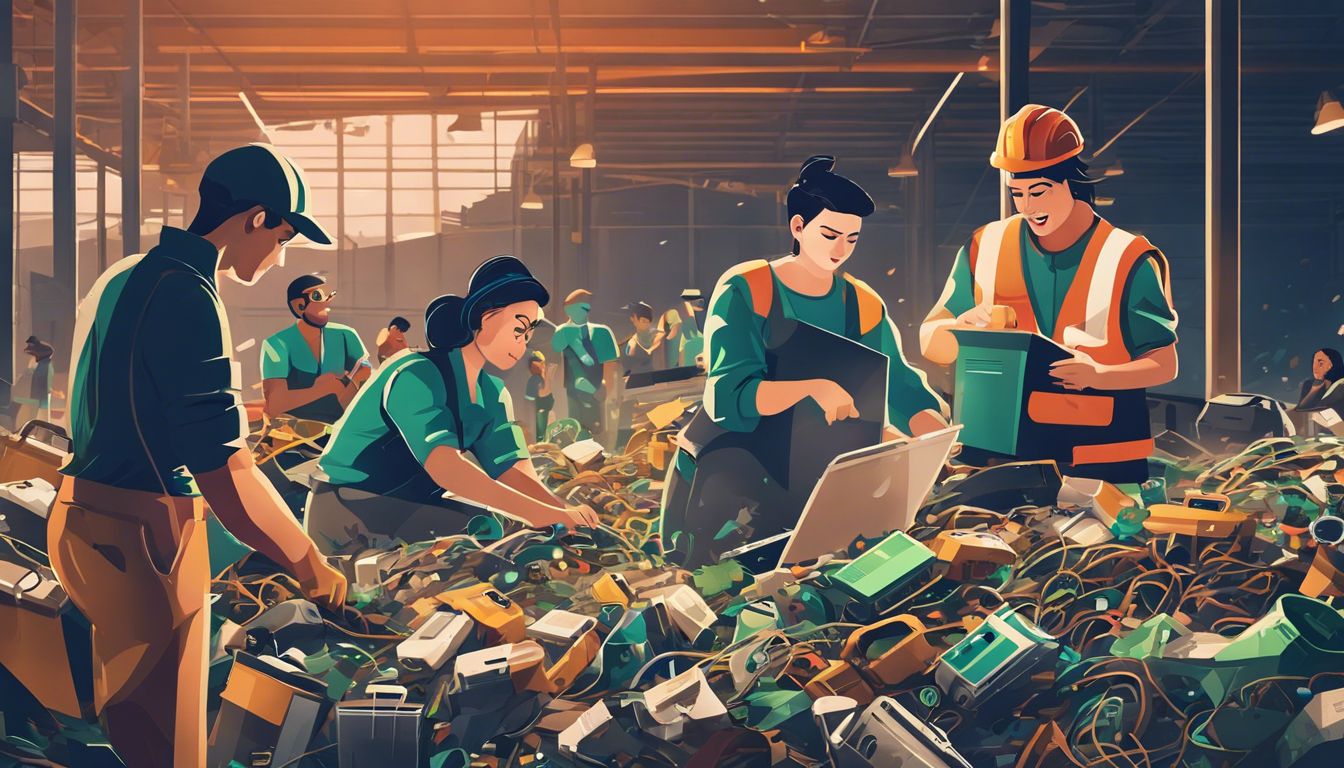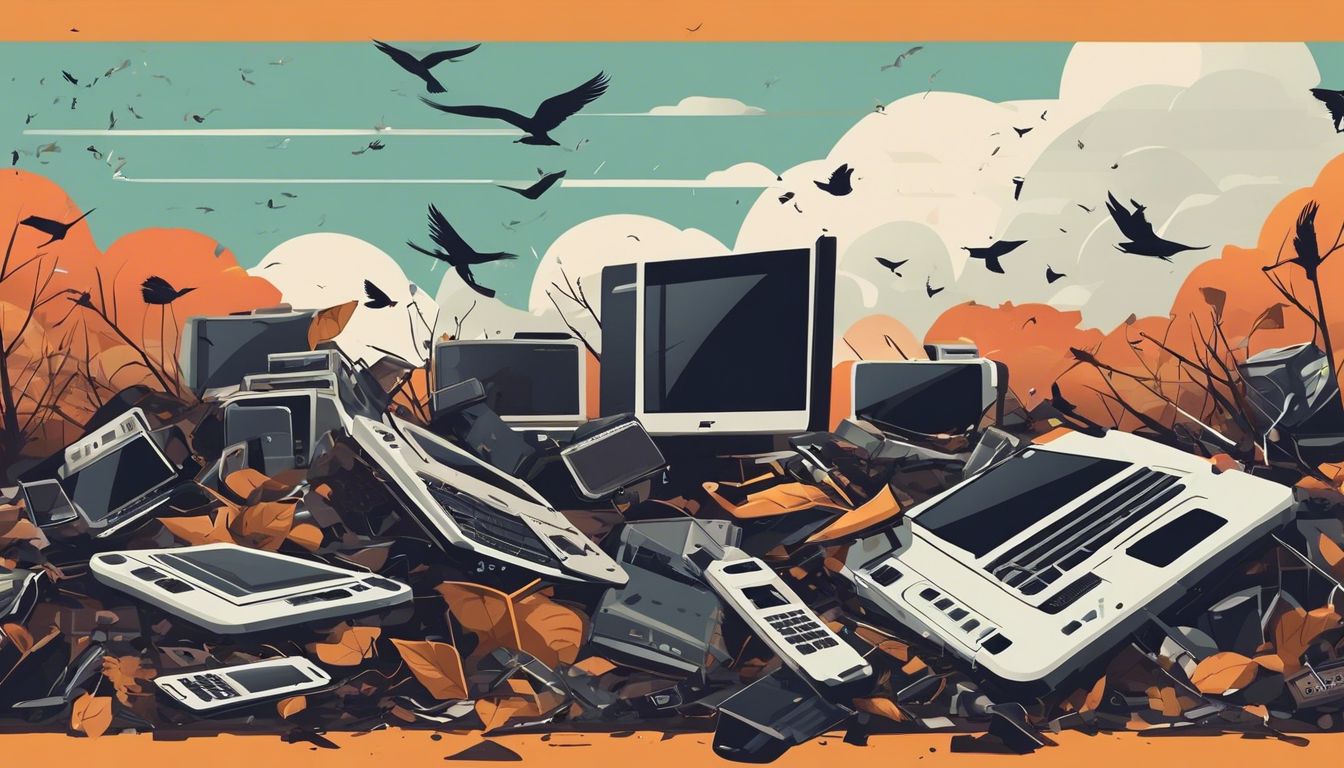E-waste recycling for businesses is a big deal. It's about getting rid of old electronics the right way. In 2016, we had 44.7 million tons of e-waste around the world, but only a bit got recycled properly.
That's not good because this stuff has harmful things like mercury and lead that can hurt our planet and health if they're not handled right. There are about 250 million computers in the U.S. that will be too old to use soon, so we need to manage e-waste better.
Recycling helps us use less from nature, keeps our data safe, creates jobs, and brings in money for the government. Urban mining takes parts from thrown-out electronics which can be used again instead of throwing them away.
Teaching companies why it’s important to recycle stops so much waste from piling up.
A company called Great Lakes Electronics Corporation is really good at recycling in an eco-friendly way for everyone including businesses.
The United Nations' Step-Initiative works hard to teach people how to deal with e-waste well.
We all have a part to play in solving this problem with technology trash.
Let's discover what businesses can do next!
Key Takeaways
- Businesses face a big challenge in disposing of electronic waste, with 44.7 million tons created in 2016 alone.
- E – waste contains harmful toxins but also precious materials like gold and silver that can be recycled.
- Recycling e – waste helps the environment by reducing pollution from toxins and saving resources.
- Companies have tools to manage e – waste better, like recycling programs and teaching employees about waste reduction.
- Choosing the right e – waste recycling partner is important for businesses to handle their electronic waste responsibly.
Understanding E-Waste

Now, let's delve into what e-waste really is. E-waste, or electronic waste, includes discarded computers, smartphones, laptops and other electronics that have reached the end of their useful life.
These gadgets pack toxins like mercury and lead which can harm our environment if not handled properly. Despite being rich in valuable materials like gold, silver and copper mined from the earth – much of it ends up wasted because it isn’t recycled.
E-waste poses a serious challenge as we grapple with both environmental impacts and the loss of precious resources. It's shocking to learn only 20% of $64.6 billion worth recoverable materials was properly processed in 2016.
With demand for new devices rising fast globally, we see an ever-growing pileup of outdated tech needing sustainable disposal routes. It’s crucial to bring awareness about recycling options among businesses dealing with e-waste regularly to ensure they are part of a circular economy rather than adding to landfills polluting our planet.
The Environmental Impact of E-Waste

Having explored what e-waste is, it's critical to consider its environmental toll. Discarded devices end up releasing toxins like mercury and cadmium into the ground when they are not properly recycled.
These harmful substances can seep into waterways, poisoning drinking water and harming ecosystems. With 44.7 million tons of electronic waste generated in 2016 alone, the scale of contamination is vast.
E-waste also contributes significantly to air pollution when incinerated. Burning electronics releases dangerous chemicals such as dioxins and furans into the atmosphere. This form of disposal risks human health and adds to greenhouse gas emissions that drive climate change.
The materials lost through improper e-waste handling could have been reused; only a fraction gets recovered for recycling efforts each year.
The Cost of Commercial E-Waste Disposal: Keeping Numbers Low
Disposing of electronic waste in a commercial setting is far from being just an environmental concern; it's a financial challenge, too. Businesses must navigate the delicate balance between ecologically responsible disposal and the impact on their bottom line. With proper strategies, these costs can be more manageable, ensuring both fiscal and environmental responsibility.
| Aspect | Consideration | Cost-Saving Measure |
|---|---|---|
| Regulatory Compliance | Abiding by state laws and regulations | Partnering with certified e-waste recyclers to avoid fines |
| Logistics | Transportation to recycling facilities | Choosing local recyclers to reduce transport costs |
| Volume | Large quantities of e-waste | Implementing asset recovery programs to recapture value |
| Data Security | Protecting sensitive information | Using services that guarantee data destruction |
| Material Recovery | Recycling valuable components | Engaging in urban mining to reclaim precious metals |
| Producer Responsibility | Manufacturers’ take-back programs | Leveraging available e-waste take-back services |
| Educational Initiatives | Raising awareness among staff | Conducting training sessions to reduce e-waste generation |
By considering these aspects, businesses can streamline their e-waste disposal processes. Collaborating with the right recycling partners, we can pave the way for both financially savvy and environmentally friendly e-waste management. These actions preserve valuable resources and foster a sustainable business model.
Solutions for E-Waste Problems in Businesses
5. Solutions for E-Waste Problems in Businesses:.
Navigating the thorny path of e-waste management, businesses stand at a crossroads—continue down the road to digital dumping or pioneer effective strategies that not only combat this growing issue but also bolster their green credentials.
It's time to explore smart solutions that ensure electronic waste becomes a resource rather than a relentless challenge; these innovative approaches extend far beyond mere disposal, embedding sustainability into the very heart of corporate practice.
Recycling
Recycling turns e-waste into valuable resources again. It helps keep toxic chemicals like mercury and lead out of the environment. Every computer, phone, or battery contains precious metals such as aluminium and rare earths.
By recycling these items, businesses can recover these materials instead of wasting them.
E-waste recycling firms specialise in this process. They use advanced techniques to safely break down electronic waste and extract useful elements. This not only reduces environmental harm but also supports a circular economy where products are reused rather than thrown away.
Now let's consider how education plays a role in managing e-waste effectively for businesses.
Education
Teaching staff and community members about e-waste is vital. Share facts on recycling electronic waste to cut down pollution. Explain how throwing away gadgets can harm our planet.
Use clear examples, like toxic chemicals from old phones poisoning the water.
Host events to make learning about e-waste fun and engaging. Discuss the Step-Initiative by the United Nations for a global effort against this issue. Train professionals in waste management through workshops and seminars.
Encourage employees to bring in old electronics for proper disposal. Partner with schools to inform students of e-waste dangers early on. Knowledge is power—it helps everyone make better choices for a cleaner world.
Next, let's explore urban mining and how it offers a treasure trove of resources without digging into the earth..
Urban Mining
Educating staff on e-waste leads to better practices, like urban mining. This innovative approach extracts valuable materials from old electronics. Think of it as a treasure hunt in our own tech trash.
Urban mining digs out metals like aluminum and rare earth elements from discarded gadgets. These can be reused in new devices.
Urban mining helps cut down the need for raw material extraction, saving energy and reducing carbon emissions. It's key that companies understand this process isn't just eco-friendly but also cost-effective.
It taps into the $64.6 billion worth of recoverable materials lost annually because we don't recycle enough e-waste. Your business could take advantage of these resources sitting in unused computers and broken cell phones.
Top E-Waste Recycling Companies for Businesses
Businesses must choose the right e-waste recycling companies. These firms handle electronic waste responsibly and help preserve our planet.
- Sims Recycling Solutions – A global leader in electronics reuse and recycling, Sims offers services for IT asset disposal and recovery of valuable materials.
- Electronic Recyclers International (ERI) – They specialise in the dismantling of electronic devices safely and securely, providing data destruction services alongside recycling.
- TerraCycle – This innovative company has various programmes to recycle difficult-to-recycle materials and offers free recycling for certain types of e-waste.
- Waste Management – Known for their comprehensive waste services, they also offer tailored solutions for e-waste, ensuring proper disposal or refurbishment.
- Global Environmental Services (GES) – GES provides full-service e-waste management, including reverse-logistics and end-of-life solutions to ensure maximum recyclability.
- Veolia – They focus on turning e-waste into new resources through advanced environmental solutions that aim at sustainability and reduction of landfill use.
- Umicore – Aiming at urban mining, Umicore recovers precious metals from e-waste using smelting processes that minimise environmental impact.
The Opportunity of E-Waste Recycling for Businesses
E-waste recycling opens doors for new business opportunities. You can turn trash into treasure, recovering valuable materials like rare earth metals from old electronics. This process saves on costs to source raw materials and protects the environment by reducing the need to mine new resources.
Jobs are created in the recycling sector, helping local economies grow. Plus, with smart waste management strategies, your company could reduce garbage handling costs.
Urban mining from e-waste is cost-effective and less damaging to our planet than traditional mining. It lets you tap into a stream of precious metals without digging a single hole in the ground.
Companies that invest in electronic waste recycling stand out as leaders in corporate responsibility and sustainability. They gain a competitive edge by showcasing their commitment to eco-friendly practices.
Moving forward into “The Role of Companies in Addressing the E-Waste Problem,” it's clear that businesses play a crucial role..
The Role of Companies in Addressing the E-Waste Problem
Companies have a big responsibility in managing e-waste. They design, make, and sell electronic goods. Now they must help in recycling them too. This is where extended producer responsibility (EPR) comes into play.
It means companies take care of their products even after people stop using them.
Firms can start by creating electronics that last longer and are easier to recycle. Teaching staff about reducing waste is also key. Companies should use less packaging and choose materials that don't harm the environment.
They can set up takeback programs where people return old devices right to the company.
Every business needs a good plan for dealing with electronic waste. They should follow the waste management hierarchy: prevention first, then reuse, recycling, recovery, and disposal as the last option.
Company Waste Managers need to work closely with top e-waste recycling firms to make sure nothing gets wasted.
These steps show leadership in solving the global e-waste problem. They cut down pollution and save precious resources like metals and plastics from ending up as scrap or harming places like Guiyu in China.
The Future of E-Waste: Avoiding Digital Dumping
Transitioning from the pivotal role that businesses play in e-waste management, we now look towards a sustainable future. The battle against digital dumping advances with each innovative step towards responsible disposal and recycling.
Businesses lead the charge, redefining waste strategies to align with global standards like the Basel Convention. Pioneering this change are companies that invest in full-life-cycle approaches and champion ‘right to repair' policies.
By embracing urban mining techniques, firms can extract valuable metals from old electronics instead of mining natural resources. This creates a closed-loop system where materials continually circulate within the economy.
Strategies such as net zero goals and waste reduction pledges show commitment beyond mere compliance. Forward-thinking companies not only contribute to cleaner environments but also secure their place as leaders in a more resource-resilient business landscape.
They rely on state-of-the-art recycling processes provided by leading electronic recycling entities like Great Lakes Electronics Corporation which ensures hazardous materials are safely handled, thus safeguarding both human health and ecology for tomorrow's generations.
Conclusion
E-waste is a growing issue for businesses, but solutions are within reach. Recycling turns old tech into valuable resources again. Companies like Great Lakes Electronics lead the way in responsible e-waste management.
By choosing to recycle, firms save money and protect the environment.
What actions will your business take to tackle electronic waste? Remember, each piece of recycled tech makes a difference. Let's all work together for a cleaner, smarter future.
To explore more about keeping the costs of commercial e-waste disposal manageable, visit our in-depth guide on what UK rubbish really costs.
FAQs
1. What exactly is e-waste, and why should businesses worry about it?
Electronic waste—often shortened to e-waste—includes outdated or broken electronic equipment like computers and phones. Businesses need to care because these items can hurt the environment with toxic heavy metals if dumped wrongly.
2. How do e-waste recycling companies help with pollution control?
E-waste recycling companies are experts at safely breaking down old electronics. They make sure harmful stuff like PVC and flame retardants don't end up causing air or water pollution.
3. Can recycling electronic waste really make a difference in developing countries?
Yes, indeed! By properly recycling, we stop dangerous practices seen in places like Guiyu, China where electronics are often dismantled unsafely, leading to serious health and environmental harm.
4. Is there a connection between consumer electronics life cycles and planned obsolescence?
You bet – as products like smartphones get designed for shorter life cycles due to planned obsolescence, they turn into e-waste quicker. It's key for businesses to think ahead about how they'll recycle these goods responsibly.
5. What role does the internet of things (IoT) have in creating more e-waste?
The IoT means more gadgets are connected online—from fridges to watches—leading them all towards becoming future e-waste as technology advances and devices get replaced faster.
6. Are there recyclable parts in big-ticket items like electric vehicle batteries or solar panels?
Surely! Components from electric vehicle batteries and even solar panels can be reused or recycled by specialist companies who know precisely what they're doing—you just have to find the right one.
Cost of Commercial Waste Disposal UK: Keeping the Numbers Low: What UK Rubbish Really Costs
Managing rubbish costs money. UK companies know this too well, as they deal with heaps of trash every day. Every year, these businesses create 27.5 million tonnes of commercial waste and 13.6 million tonnes of industrial waste – that's a mountain weighing 41.1 million tonnes! Tossing all that waste can eat up to 4-5% of […]
Comparing US Waste Disposal Companies: Top Landfill Waste Competitors: The Ultimate Eco Disposal Company Showdown
Waste disposal companies play a big role in how we take care of our planet. They handle the trash and recycling from homes, businesses, and cities. Some of the biggest names in this industry are Waste Management, Republic Services, Veolia North America, Rumpke Waste & Recycling, and Casella Waste Systems, Inc. These companies work to […]
Waste Companies Offering Eco-friendly Services – UK's Best Circular Economy Waste Services
Think about how we throw away stuff. Imagine if that waste could help make new things. Well, that's the mission of all waste companies offering eco-friendly services. This idea is called circular economy in waste management. It's like a loop where trash gets a new life instead of hurting our planet. In the UK, some […]
Plastic Recycling UK Companies: Plastic Reused: UK's Leading Plastic Resin Recyclers Revealed
Plastic recycling in the UK is a hot topic. The country recycles 46.2% of its plastic, but it wants to do more by hitting 50% by 2020. The leading plastic recycling UK companies know what to do and every piece of plastic has a resin code showing how easy it is to recycle—the lower, the […]









